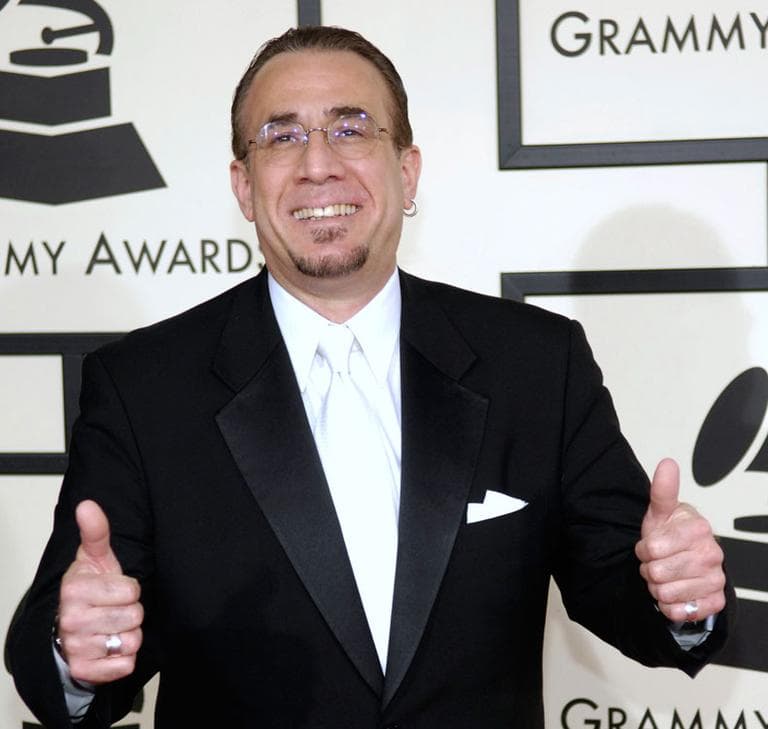Advertisement
Grammy Changes Will Damage Music Careers, Berklee Professor Says
ResumeConsider this turn of events: Drummer Bobby Sanabria, a 1979 graduate of the Berklee College of Music in Boston, was nominated for a 2008 Grammy Award in the Best Latin Jazz category for his album "Big Band Urban Folktales." But for this year's Grammy Awards ceremony, which take place Sunday, Sanabria couldn't even have been nominated in that category.

That's because it no longer exists.
The organization that runs the Grammys has slashed the total number of award categories this year from 109 to 78. Also gone are categories including Hawaiian, Native American, Zydeco, Cajun, some gospel, and some instrumental pop, rock and country.
To find out what these changes mean for Boston-area musicians, WBUR's All Things Considered host Sacha Pfeiffer spoke with John Kellogg, assistant chair of the music business/management department at Berklee. He is also an entertainment attorney and a former lead singer of the group Cameo.
Sacha Pfeiffer: You have said before that you think these changes will hurt musicians, like your students, and may even hurt some of the current 30 nominees for Grammys this year who have some connection to Berklee. Why do you think it could hurt them?
John Kellogg: Well, it disadvantages students because at some point, once they graduate and they get involved in the industry, they're going to want to have the greatest opportunity to have these kind of nominations, because it really helps and bolsters their careers as far as sale of records and even live performance fees and the number of engagements they can have.
I'm an entertainment lawyer and I had a client that was nominated a couple of years ago in the Best Gospel/Male Performance category, which is eliminated this year, and as a result of him just being nominated he received more performance dates and it increased his record sales.
The National Academy of Recording Arts and Sciences, which runs the Grammys, said it made these changes to make the Grammys more competitive and meaningful. The group points out that in some categories, there were so few people entering that it really diluted the impact of the award. In fact, at the first Grammys in the late 1950s, there were only 17 awards. Somehow it ballooned to more than 100. Do you think the academy has a fair point when it says that by winnowing down the number of categories, the Grammys will mean more?
They do have a point, and I'll be frank with you: I went to the awards last year and the pre-televised awards were very long.
Because there were so many categories?
There were so many categories. And they felt that they had to pare it down. But it's still going to have a devastating effect for many genres of music.
Sanabria is actually leading a class-action lawsuit against the Grammy organization that claims that these changes are racist because a substantial percentage of the affected categories are broadly considered ethnic. Now on the other hand, there are certainly some non-ethnic categories eliminated, like Children's Spoken Word, and the vocal categories that are separate for male and female have now been combined into unisex categories. Do you think the racist charge is fair?
No. I don't think that that was the intent at all. The rock categories have been halved. The R&B categories have been halved. Country music has been halved. So even though I don't think that was the intent, the music that's popular today on the Hot 100s really emanate from a jazz, R&B, soul music base. So that's the reason why I think that it's so hurtful to people from minority groups.
And overall, you think just fewer opportunities for Berklee grads may be the end result of this?
Absolutely. I was just at an event with Lalah Hathaway, the daughter of the late, great Donny Hathaway. And she's a Berklee grad, and she won an award last year with Kirk Whalum — the Best Gospel Song. And she was concerned about it — not so much for her, but for some of her friends who are in the industry that would normally have been nominated in these R&B or urban music categories that aren't going to have that opportunity now.
Of the 30 Berklee-related nominees this year, any that — if you were a betting man — you think might come away with a Grammy this year?
Well, I think a number of them will. We have great songwriters — Claude Kelly. We have great producers — Makeba Riddick — that have written great songs and produced great songs. And they've won in the past, and I think they'll win again this year.
This program aired on February 10, 2012.